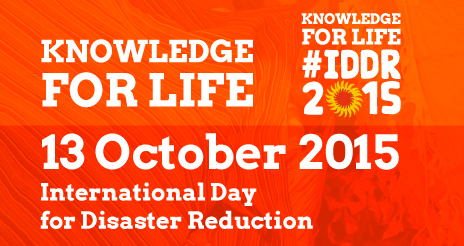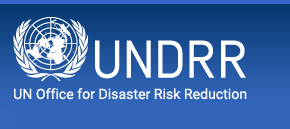| 2000 |
 |
|
 |
Res. 54/219 |
International Strategy for Disaster Reduction
Taking note of Economic and Social Council resolution 1999/63 of 30 July 1999 on the successor arrangements for the International Decade for Natural Disaster reduction, the GA endorses the proposal of the Secretary-General to establish an inter-agency task force and inter-agency-secretariat for disaster reduction, under the direct authority of the Under-Secretary-General for Humanitarian Affairs; decides to maintain the observance of the International Day for Disaster Reduction on the second Wednesday of October.
|
| |
|
|
| 2001 |
 |
|
 |
Res. 56/195 |
International Strategy for Disaster Reduction
The GA requests the relevant organizations of the United Nations system to support the implementation of the goals of the Strategy, and endorses the proposal of the Secretary-General to review the implementation of the Yokohama Strategy for a Safer World |
| |
|
|
| 2002 |
 |
|
 |
Res. 57/256 |
International Strategy for Disaster Reduction
The GA requests the Secretary-General, with the assistance of the inter-agency secretariat for the Strategy, to plan and coordinate, in consultation with Governments and relevant organizations of the United Nations system, including international financial institutions, the 2004 review of the Yokohama Strategy |
| |
|
 |
|
The Johannesburg Plan of Action
The World Summit on Sustainable Development (WSSD), in Johannesburg, South Africa, in August-September 2002 provided the ISDR with a concrete set of objectives within the sustainable development agenda to which both the Inter-Agency Task Force on Disaster Reduction and the UN/ISDR secretariat, along with partners, will increasingly turn their attention and capacities to integrating and mainstreaming risk reduction into development policies and processes |
| |
|
 |
A/57/190 |
In his report on the ISDR (A/57/190) the UN Secretary-General specifies that: "This review process will help identify gaps and means of implementation in a way that will chart the course of action for the forthcoming decade, while taking into account the outcome of the World Summit on Sustainable Development" |
| |
|
|
| 2003 |
 |
|
 |
Res. 58/214 |
International Strategy for Disaster Reduction
The GA decides to convene a World Conference on Disaster Reduction in 2005, to conclude the review of the Yokohama Strategy and its Plan of Action; to identify specific activities aimed at ensuring the implementation of relevant provisions of the Plan of Implementation of the World Summit on sustainable development on vulnerability, risk assessment and disaster management; to share best practices and lessons learned to further disaster reduction within the context of attaining sustainable development and identify gaps and challenges; to increase awareness of the importance of disaster reduction policies; and to increase the reliability and availability of appropriate disaster-related information to the public and disaster management agencies in all regions, as set out in the relevant provisions of the Johannesburg Plan of Implementation; . The ten-year review takes into account several relevant processes, such as the Johannesburg Plan of Implementation of the World Summit on Sustainable Development, and will culminate in the Second World Conference on Disaster reduction to be held in Kobe, Japan, in January 2005.
|
 |
Res. 58/215 |
Recalling its decision 57/547 (Dec. 2002) the GA urges the international community to continue to address ways and means, including through cooperation and technical assistance, to reduce the adverse effects of natural disasters, including those caused by extreme weather events, in particular in vulnerable developing countries, through the implementation of the International Strategy for Disaster Reduction |
| |
|
|
| 2004 |
 |
|
 |
Res. 59/231 |
International Strategy for Disaster Reduction
The GA welcomes the work of the ongoing preparatory process for the World Conference on Disaster Reduction, to be held in Kobe, Japan, from 18 to 22 January 2005 and notes with appreciation the pledge made by the Government of Japan to cover costs of the World Conference.
|
 |
Res. 59/232 |
The GA underscores the importance of maintaining the El Niño/Southern Oscillation observation system, continuing research into extreme weather events, improving forecasting skills and developing appropriate policies for reducing the impact of the El Niño phenomenon and other extreme weather events and emphasizes the need to further develop and strengthen these institutional capacities in all countries, in particular in developing countries; . |
| |
|
|
| 2005 |
 |
|
 |
Res. 60/195 |
International Strategy for Disaster Reduction
It endorses the Hyogo Declaration and the Hyogo Framework for Action 2005-2015: building the resilience of Nations and communities to disasters adopted by the World Conference on Disaster Reduction, held at Kobe, Hyogo, Japan, from 18 to 22 January 2005, and recalls the common statement of the special session on the Indian Ocean disasters: risk reduction for a safer future.
|
 |
Res. 60/196 |
The GA urges the international community to continue to address ways and means, including through cooperation and technical assistance, to reduce the adverse effects of natural disasters, including those caused by extreme weather events, in particular in vulnerable developing countries, including least developed countries and in Africa, through the implementation of the International Strategy for Disaster Reduction, including the Hyogo Framework for Action, and encourages the Inter-Agency Task Force for Disaster Reduction to continue its work in this regard |
| |
|
|
| 2006 |
 |
|
 |
Res. 61/198 |
International Strategy for Disaster Reduction
The Global Platform on Disaster Reduction
The GA notes the proposed establishment of a Global Platform for Disaster Risk Reduction as the successor mechanism of the Inter-Agency Task Force for Disaster Reduction, and, taking into account the implementation of the Hyogo Framework for Action, decides that the Global Platform shall have the same mandate as the Inter-Agency Task Force for Disaster Reduction, and requests the Secretary-General to include information on the Global Platform, for consideration by the General Assembly, in his next report; Decides that the proposed establishment of the Global Platform should continue to be carried out in an inclusive and transparent manner and be open to all Member States.
|
 |
Res. 61/199 |
The GA recognizes the ongoing efforts made by the Government of Ecuador, the World Meteorological Organization and the inter-agency secretariat for the International Strategy for Disaster Reduction which have led to the establishment of the International Centre for the Study of the El Niño Phenomenon at Guayaquil, Ecuador, and encourages them to continue their support for the advancement of the Centre.
|
 |
Res. 61/200 |
The GA urges the international community to continue to address ways and means, including through cooperation and technical assistance, to reduce the adverse effects of natural disasters, including those caused by extreme weather events, in particular in vulnerable developing countries, including least developed countries and in Africa, through the implementation of the International Strategy for Disaster Reduction, including the Hyogo Framework for Action 2005-2015: Building the Resilience of Nations and Communities to Disasters, and encourages the institutional arrangement for the International Strategy to continue its work in this regard. |
| |
|
|
| 2007 |
 |
|
 |
Res. 62/192 |
International Strategy for Disaster Reduction
First session of the Global Platform on Disaster Reduction
The GA takes note with great interest and appreciation of the holding at Geneva, from 5 to 7 June 2007, of the first session of the Global Platform for Disaster Risk Reduction, the successor mechanism of the Inter-Agency Task Force for Disaster Reduction, as a useful forum for Member States and other stakeholders to assess progress made in the implementation of the Hyogo Framework for Action, enhance awareness of disaster risk reduction, share experiences and learn from good practice, identify remaining gaps and identify actions to accelerate national and local implementation. |
| |
|
|
 International Day for Disaster Reduction #DIRD 2015 Knowledge for Life
International Day for Disaster Reduction #DIRD 2015 Knowledge for Life